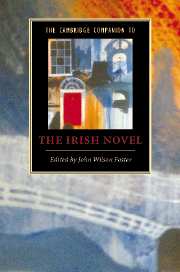Book contents
- Frontmatter
- Introduction
- 1 The novel before 1800
- 2 The national tale and allied genres, 1770s-1840s
- 3 The novel of the big house
- 4 The Gothic novel
- 5 Catholics and fiction during the Union, 1801-1922
- 6 Irish modernisms, 1880-1930
- 7 James Joyce
- 8 Region, realism and reaction, 1922-1972
- 9 The novel in Irish
- 10 Women novelists, 1930s-1960s
- 11 Two post-modern novelists: Samuel Beckett and Flann O’Brien
- 12 Life writing in the twentieth century
- 13 The novel and the Northern Troubles
- 14 Contemporary Irish fiction
- Index
10 - Women novelists, 1930s-1960s
Published online by Cambridge University Press: 28 January 2007
- Frontmatter
- Introduction
- 1 The novel before 1800
- 2 The national tale and allied genres, 1770s-1840s
- 3 The novel of the big house
- 4 The Gothic novel
- 5 Catholics and fiction during the Union, 1801-1922
- 6 Irish modernisms, 1880-1930
- 7 James Joyce
- 8 Region, realism and reaction, 1922-1972
- 9 The novel in Irish
- 10 Women novelists, 1930s-1960s
- 11 Two post-modern novelists: Samuel Beckett and Flann O’Brien
- 12 Life writing in the twentieth century
- 13 The novel and the Northern Troubles
- 14 Contemporary Irish fiction
- Index
Summary
As political trauma decreased and conditions improved slowly in the 1930s, the opportunity of higher education and the growth of a middle class increased the confidence and raised the profile of Irish women writers, after a national cultural revival in which they played a secondary role. The political rationale on all sides in the Anglo-Irish debate, while acknowledging and protesting ethnic and religious restrictions, had rested on unacknowledged gender and class restrictions which consumed or distorted many voices prior to independence. This national or political debate disappears in the work of most Irish women writers, although the related religious divide continues to be important, particularly in Northern Ireland. Ignoring divisive political debates enabled women to attend to the very distinctions and restrictions which buttressed these debates and continued to affect most women negatively. This close link between subject and writer, between the real and the fictional life, might have produced emotional or pedantic work, but the important novels of the period reflect the wisdom, detachment and humour of disciplined artists, related no doubt to the financial and educational privilege of the writers themselves. Uninterested in either the fantasies of the Irish Literary Revival or the formal experimentation of the modernists, subject matter being the locus of their attention, women novelists embraced realism, occasionally achieving poetic beauty.
- Type
- Chapter
- Information
- The Cambridge Companion to the Irish Novel , pp. 189 - 204Publisher: Cambridge University PressPrint publication year: 2006

